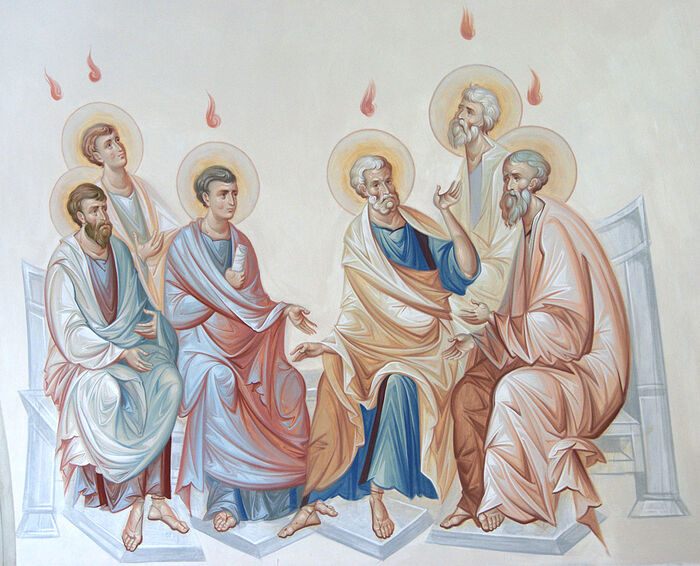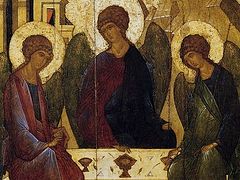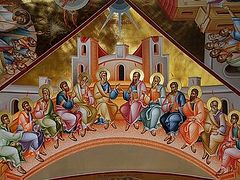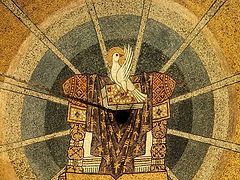An outstanding Anglican hymn comes from a fourteenth-century Italian spiritual poem, Descendi Amor Santo. We have it today as “Come Down, O Love Divine” which is paired with an inimitable tune by the composer Ralph Vaughn Williams. The text and the music together speak of inward change and sanctification, and in a beautiful fashion, all so appropriate to the Holy Spirit who is God unseen and yet dwelling within us:
Come down, O Love divine, / seek thou this soul of mine, /and visit it with thine own ardor glowing; O Comforter, draw near, / into my heart appear, / and kindle it, thy holy flame bestowing.1
The descent of the Holy Spirit is a second incarnation coming after Christ’s ascension and in fulfillment of His promise when He said: If you love Me, keep My commandments. And I will pray the Father, and He will give you another Helper, that He may abide with you forever— the Spirit of truth, whom the world cannot receive, because it neither sees Him nor knows Him; but you know Him, for He dwells with you and will be in you (Jn 14:15–17, NKJV)
The promise is twice fulfilled after the Resurrection. The first instance is when, Jesus said to them again, “Peace to you! As the Father has sent Me, I also send you.” And when He had said this, He breathed on them, and said to them, “Receive the Holy Spirit” (Jn 20:21–22) Our Savior first gives peace, then sends comfort and help. In the second instance, Jesus sends the Holy Spirit into the world as fire and power. The apostles and the Virgin Mary Theotokos are in the upper room in Jerusalem waiting on the day of Pentecost when the Holy Spirit arrives as a violent wind bestowing the grace of languages, but also his very presence (Acts 2:2–4). The apostles will extend this presence to their successors through the laying on of hands. The Holy Spirit creates the Church on Pentecost, and every day since.
The second issuing of the Spirit is also the regeneration of the world, the natural conclusion to Pascha. What the resurrection is to death, namely, its undoing; the descent of the Holy Spirit is to life, its endless propagation, both in this world and the next.
The Orthodox liturgy has its own masterful combinations of text and music. In the Hymns of Ascent, heard at the Saturday Vigil, we hear this:
“From my youth / do many passions war against me; / but do Thou Thyself defend / and save me, O my Savior. Ye haters of Zion / shall be shamed by the Lord; / for like grass, / by the fire shall ye be withered. Glory to the Father and to the Son and to the Holy Spirit, both now and ever, and unto the ages of ages. Amen. In the Holy Spirit, / every soul is enlivened, / and, through cleansing, is exalted and made radiant / by the Triple Unity in a sacred mystery.2
Grass parched by fire recalls the Paschal Verses “Let God arise, let his enemies be scattered. Let them flee his face as wax melts before the flame.” The Holy Spirit is that fire withering our imperfections. We call him “The Sanctifier” since no holy act is possible without him: No one can say that Jesus is Lord except by the Holy Spirit (1Cor. 12:3). The Valaam chant setting is so poised with the tension of the divine purifying fire turning into holy illumination, the warmth of divinity. The music increases the text, a reminder of what God is doing for us.
Resurrection in Christ is complete only when we are lifted up into heaven. Truly, we are alive in Christ when the hidden inner life of the Holy Spirit touches us and elevates into itself. We call this theosis, deification, and there is so much more to say. But we can rest secure that the Christian spiritual tradition testifies to a sacred ascent into the source of life, through the Giver of Life.




